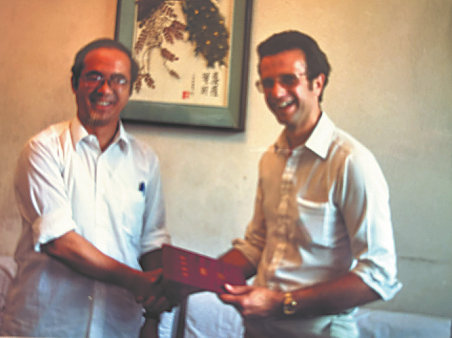

My first visit to China was in 1986 and in 1987, I received an invitation to teach a short course on marketing to students at Shandong University, located in Jinan of Shandong province, as well as a university in Jilin city of Jilin province. I had agreed to these arrangements on the condition that I would fly from Jinan to Jilin.
Unbeknown to me, at that time, all flights were routed through Beijing and the ticketing arrangements proved too challenging for my host. On my third day in Jinan, I was advised that flying was "not possible" but there was a first class (soft sleeper) direct train between the two places. This was only my second visit to China; I did not speak the language; I did not understand Chinese culture and I was apprehensive. Twelve hours prior to my departure, my host advised me that the train ticket was second class (hard sleeper) and I would be sharing a compartment with five others! The impact of that journey would change my opinion of China and its people while influencing my career for the next 38 years.
China was an enigma to most of us who lived in the West, particularly during the late 1960s. In the words of Rudyard Kipling: "East is East and West is West and never the twain shall meet". However, we in the West conveniently forgot the closing stanza to the ballad, which proclaims there is no difference between two strong men when they "stand face to face, though they come from different ends of the Earth". I was soon to learn the importance of this final stanza.
Upon boarding the train, I was introduced to my travel companions and the official in charge of the carriage, who would ensure I got off the train at Jilin. My host departed, and I was left as the only "white face" on the train with few passengers having any command of English. The two families I was sharing the compartment with smiled politely at me and offered me the top bunk. At 2 pm precisely, the doors closed, the whistle blew, and we sedately exited the railway station. As the train gathered speed, my co-passengers placed cups on the table and poured tea, with one cup for me.
Over the next 24 hours, I experienced the hospitality accorded to visitors by the citizens of this vast country. I was welcomed into families and included in all meals. I had been supplied with provisions by my host but each time the train stopped, I was gifted local delicacies purchased by the two families from the platform vendors.
Some of the younger travelers spoke a little English and we communicated in the corridor while sharing cigarettes and watching the countryside pass by. I was amazed by the number of people tending the fields until late into the evening and back at first light the following day. There was little mechanization but plenty of hard honest work. By the time the train arrived in Jilin station, my opinion of China had been transformed. No longer was China an enigma, the people were warm, open and hospitable, possibly more so than many Western countries. There were few, if any, egos on display.
During the later years of the last century, under the guidance of late Chinese leader Deng Xiaoping (1904-97), China was committed to pursuing an emerging philosophy of opening up, guided by "socialism with Chinese characteristics". Following the global financial crisis, China realized that the West did not have all the answers. In recent years, the country has been pursuing a form of modernization with Chinese characteristics, promulgated by President Xi Jinping, which focuses on a people-centric approach as opposed to the capitalist focus of Western modernization.
Historically, the world has survived with one superpower. In recent times, the mantle went from the British Empire to the United States following World War II. Today, China and the United States are the two major global economic powers. The world has benefited from their cooperation in a way that was unimaginable when I boarded the train to Jilin decades ago.
The author is Ed Weymes, associate dean of Global Programs and Projects at the International Office of the University of Waikato, Hamilton, New Zealand.